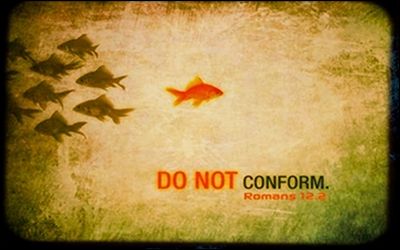Do Not Conform
Do not be conformed to this present world, but be transformed by the renewing of your mind, so that you may test and approve what is the will of God - what is good and well-pleasing and perfect (Romans 12:2)
The full title for this writing should be: Do not conform to the patterns of this world. This article begs to differ with virtually all known commentaries and messages from pulpits everywhere that it does not mean what they generally propose.
(Bấm vào đây để đọc tiếng Việt)
The world, the flesh, and sin
 The general consensus is the world, whose definition we’ll explore later, is something negative that we must take care not to conform to its patterns. This negative something is generally accepted as sinful things that we must get rid of from our lives. The more of these sins we can get rid of, the closer we are to God. Oftentimes Hebrews 12:1 is brought into the picture to support the argument that we should make every effort to get rid of “the sin that easily entangles.”
The general consensus is the world, whose definition we’ll explore later, is something negative that we must take care not to conform to its patterns. This negative something is generally accepted as sinful things that we must get rid of from our lives. The more of these sins we can get rid of, the closer we are to God. Oftentimes Hebrews 12:1 is brought into the picture to support the argument that we should make every effort to get rid of “the sin that easily entangles.”
A quick survey of all available commentaries reveals that they also hold the same interpretation, or perhaps they influence the rest of Christianity with their points of views? But people don’t really need commentaries to form this world view, all you need is take a survey of some of the major world’s religions, they all hold the same concept of sins and the need to deal with them in various ways.
All religions hold the belief that the flesh is basically sinful, a negative force that must be subdued or even annihilated if one hopes to achieve a higher state of being.
It should not be a surprise to us that Christians, most if not almost all, also subscribe to this mode of thinking though it may be dressed in a more appropriate Christian language.
On the one hand we’re exhorted to “love not the world” (1 John 2:15), on the other hand we must live in it, we share in this world the work we do to make a living, we drive on the same road, we go to the same movie theater, we watch the same TV broadcast, we traverse on the same Internet highway. Wouldn’t this internal conflict cause much trouble in a Christian’s life? Much morbid introspection that weighs heavily on the heart of the one who wants to do the right thing in accordance with their faith?
Most commentaries are very long winded about what constitutes this “pattern of the world,” but to simplify the matter, the dividing line is between what is sinful and what is not, isn’t it? Then it logically follows that the command “do not conform to the patterns of this world” can be restated as simply as “do not sin anymore.” Does this make sense? Isn’t this what is implied in all sermons and writings?
It’s difficult not to talk about the world without also calling into question the issue of sin. This is reflected in all the world’s religions, and Christianity is not exempted from it. Therefore if the question of not conforming to the patterns of the world is to be understood to be analogous to stop sinning, we may be better off taken from this world altogether.
An elusive goal
Is it possible for anyone to be completely without sin? The answer is easy right from the Bible itself, therefore if “do not conform” is to be understood in the conventional sense, we’re setting ourselves up for a lifetime of discouragement and hopelessness because the fact of our daily transgression will stare at us in the face on a continual basis. I read that Martin Luther used to take 6 hours per day to confess his sins, but I believe that had Luther, or the listening priest, had the strength, he would have had confessed all day long.
The Christian things that we do
Though most pulpits do not preach it outright, virtually all pew sitters assume this is what they heard: worldly things are those not directly related to Bible study, church activities, ministries, evangelistic endeavors, prayer, etc. The way to please God is to do as many of these things as possible. We read in John 6:28-29 that upon hearing Jesus’ teaching, the crowd asked Him what the works of God were so that they could do them. People also asked Paul in Acts 16:30 about what they must do to be saved. The same type of questions were posed to Jesus in the gospels.
There is a lady in our church who works very hard to provide for her family with many sick people. Occasionally in our Sunday School class she would express her regret that she could not find time to do “God’s works.” I tried very hard to convince her that God’s works are those things she does when she works in her nail salon, when she cares for her sick husband and his sibblings, when she tries to catch a breath from between many responsibilities. In her mind these are “worldly things” that don’t count toward God’s kingdom. But it’s not just this lady who holds such a view of “the world,” it’s probably 99.99% of folks you sit next to every Sunday singing hymns of grace.
Where does this understanding, or rather misunderstanding, come from? Where else but from the lack of sound teaching to ground the flocks in the absolute promise of salvation to those who call by Jesus’ name. Most messages I heard everywhere are about things Christians should or shouldn’t do. A disproptionate amount of communication is dedicated toward topics such as family, raising children, marriage, work, play, sex, and everything that is perceived as good under the sun. But all these things, as good as most of them are, are not in the exclusive domain of Christianity; they can all be found in non-Christian sources. Christ didn’t come to address these corruptible things. He came to address an issue buried deep in the nature of man. The focus on nonessential matter is the reason few Christians are grounded in the truth of how God saves us and accepts us in His Son Jesus Christ. And when Christians are not deeply rooted in Christ, false doctrine finds its fertile ground to grow like weeds.
The Romans context
If you follow the logic of Romans from chapter 1 all the way to the passages preceding this problem concept of “do not conform to the patterns of this world,” you’d find the following key concepts:
Paul starts out by calling us into an obedience of faith, of believing in Christ, and as it is started with faith, it also ends with faith (Romans 1:17), or in other words: “the just shall live by faith,” and this is contrary to the pattern of the world in that they live by “works,” by their performances, their human efforts to try to achieve a measure of spiritual perfection.
Then he continued on to show the Romans that unrepentance is the refusal to trust in Christ alone for their salvation (Romans 2:5), and the role of the law is contrary to what they think, it does not justify but instead condemns, and no one can through the works of the law achieve God’s righteousness (Romans 3:19-20). This reliance on the law to be justified before God is again the way, or the patterns, of the world.
Then Paul continued for the remainder of Romans to show people points of contrast between the way of the world and the way of faith, one or human efforts and reliance on the law and one of faith in Christ, one of law and one of grace, one of merit projected from self to one of a gift received from God (Romans 5:15-19). The way of the world will lead to boasting because it is based on the principle of works (Romans 3:27-28).
And then in chapter 8 Paul contrasts the seeking of righteousness through the law, which is a pattern of the world, as opposed to the righteousness through Christ (Romans 10:5-13).
The real meaning
Therefore if we always keep in our sight the flow of thoughts that Paul presented from the beginning we’d have seen that “the patterns of the world” is not about philosophical differences between believers and unbelievers in their worldly pursuits, or of the sins they commit, but of the objects of their faith: who they trust to give them the righteousness they need to boldly come into God’s presence. The pattern of the world: works through the law vs. our pattern: grace through faith.
Nghi Nguyen
- Scripture quoted by permission. All scripture quotations, unless otherwise indicated, are taken from the NET Bible® copyright ©1996-2006 by Biblical Studies Press, L.L.C. All rights reserved.
Disclaimer: This is my own opinion on the topic, which does not necessarily reflect the church's theology, or beliefs of the individuals in it — Nghi Nguyen

